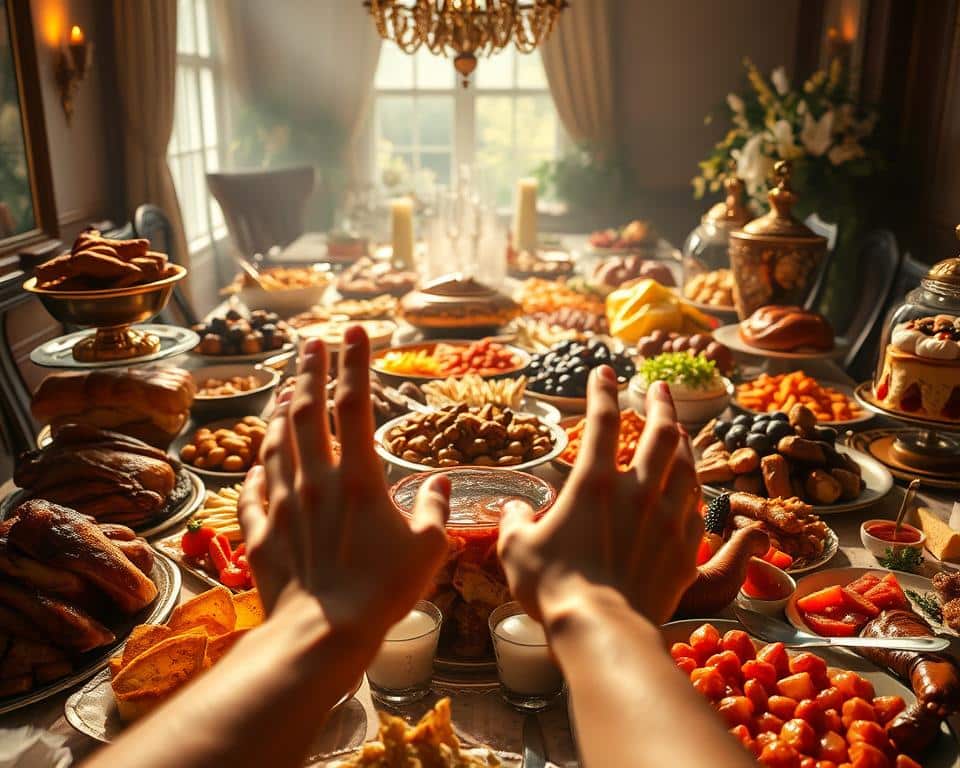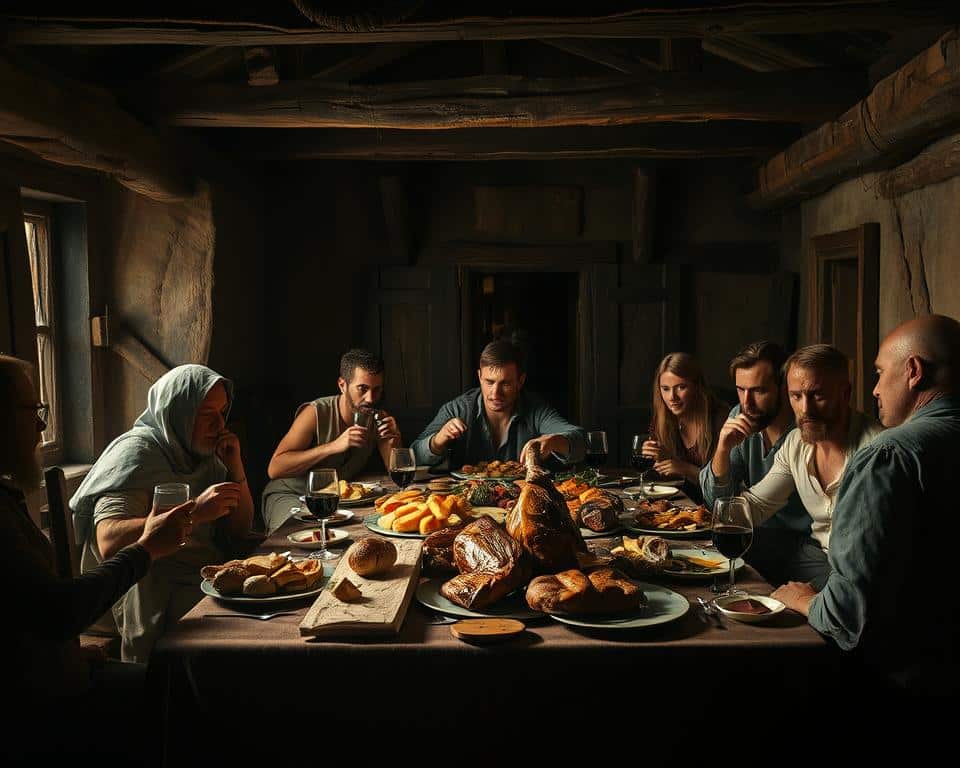“Moderation is the silken string running through the pearl of life.” — Ralph Waldo Emerson
I write as a teacher who cares about faith and daily choices. I define gluttony as overindulgence that rejects self-control and harms faith and life.
Scripture links this sin with drunkenness, idolatry, rebellion, laziness, and waste. These patterns hurt people and damage families.
I affirm that God created food as a gift. We honor God by using food with gratitude and clear limits.
This guide offers a clear Bible view on gluttony to help daily choices. I use plain language so every reader can grasp God’s word.
I will list each teaching in order and tie every point to Scripture so truth stays central. My aim is balanced guidance that lets us enjoy meals without letting them rule life.
Key Takeaways
- Gluttony means harmful overindulgence that rejects self-control.
- Scripture connects this habit with other sins that hurt families and faith.
- Food is a gift; using it with gratitude honors God.
- This guide gives a plain, Scripture-centered approach for daily choices.
- A balanced view helps people enjoy food without letting it rule life.
Gluttony in Scripture: a clear definition and why it matters
I want to show clearly why overeating matters for those who follow God. Scripture defines this habit as repeated excess that surrenders reason and desire to appetite. Overindulgence becomes a pattern, not a one-time lapse.
Habitual giving to the cravings of the flesh weakens self-control and opens a path to other sin. This pull leads a person away from God’s will and from the discipline Scripture calls us to keep.
God gives food as a good gift to enjoy with thanks. When believers let a gift become a master, it harms health and faith. We must test habits by God’s word and refuse patterns that feed the flesh.
Believers should aim to enjoy meals with gratitude and restraint. My goal for readers is simple: enjoy God’s gifts while keeping God first in desire and action.

Key warnings in Proverbs about gluttonous eaters of meat
Proverbs gives blunt warnings about how excess at the table harms life and work.
Keep company with the wise. The proverb tells us to avoid loose habits and idle friends. It links careless eating and drinking to poverty and rags.

Proverbs 23:20-21 and the link to poverty and rags
“Be not among drunkards or among gluttonous eaters of meat, for the drunkard and the glutton will come to poverty, and slumber will clothe them with rags.”
The verse warns against loose company. It ties excess to lost work and to waking up in need.
Proverbs 25:16 and limits even with honey
Even sweet food needs a limit. The saying about honey teaches portion control. Too much pleasure can bring sickness instead of delight.
Proverbs 25:28 and the need for self-control
A person without self-control is like a city with broken-down walls. That image shows how habits leave us open to harm.
| Verse | Core Warning | Practical Takeaway |
|---|---|---|
| Proverbs 23:20-21 | Company of drunkard and eaters meat leads to loss | Avoid peers who excuse excess; protect work and family |
| Proverbs 25:16 | Too much of a good thing makes you ill | Practice portion control with rich food |
| Proverbs 25:28 | Lack of self-control invites harm | Build habits that guard against collapse |
A simple test: if eaters meat drive your plans, you need a reset to Scripture and wise friends. Choose restraint. Guard your work. Avoid rags.
“Put a knife to your throat”: the wisdom of restraint
A stern phrase in Proverbs warns men to hold appetite in check at high-stakes meals. The line about “put a knife to your throat” shocks us so we will act. It asks a man to stop before desire drives him to error.
“When you sit to dine with a ruler, note well what is before you, and put a knife to your throat if you are given to gluttony.”
Proverbs 23:1-2 in high-stakes meals
Put knife throat is blunt counsel. At a ruler’s table, food, honor, and favors press the heart. You may be tempted to eat more or promise more to win favor.
Reading motives at the table (Proverbs 23:6-7)
Proverbs warns us to read the host’s mind. Offers can look generous but carry strings. Watch the giver’s intent and protect your integrity.
- Restrain appetite; refuse quick agreement for advantage.
- Slow down, measure portions, and keep a clear head.
- Remember that table discipline trains the heart for other tests.
| Situation | Risk | Practical Action |
|---|---|---|
| Banquet with leaders | Compromise for favor | Eat modestly; decline extra honors politely |
| Generous host with strings | Hidden demands | Ask motives; refuse binding promises at table |
| Personal appetite under pressure | Poor judgment | Set clear limits; pause before accepting |
Body as a temple: honor God with your body
Caring for the body is not mere health advice; it is an act of worship and stewardship.
“Do you not know that your bodies are temples of the Holy Spirit… You are not your own; you were bought at a price. Therefore honor God with your bodies.”
I affirm that the Holy Spirit dwells within believers. That truth makes daily choices weighty. How I eat, rest, and move matters to faith.
Because we were bought at a price, care for the body becomes obedience. I treat food and habit as ways to honor God and reflect the glory of Christ.
- Treat the body as God’s temple by setting healthy routines.
- Choose portion control and regular rest so the mind stays clear.
- Plan meals and activity so the body can serve with strength.
Neglect or excess dulls witness. Small, steady changes honor God and show His grace in our lives.
Romans 13:14 and the call to resist desires of the flesh
The apostle urges a daily habit: don the Lord Jesus and refuse the cravings that lead to harm. This is not a vague ideal but a clear, practical stance for each morning and meal.
“Clothe yourselves with the Lord Jesus Christ, and do not think about how to gratify the desires of the flesh.”
Put on Christ as your default response. Let prayer and Scripture set the tone before you plan food, work, or rest.
Here is a simple action plan to resist fleshly pulls without shame:
- Start with prayer and a short Scripture reading before meals.
- Plan balanced plates, set regular meal times, and drink water as a cue.
- Remove triggers: stash tempting snacks and mute online ads that invite excess.
- Swap a plan to indulge for a plan to serve—use saved resources for help and hospitality.
Remember: Scripture and prayer strengthen the will. The lord jesus supplies grace to break cycles that feed sin and free you for service and joy.
Enemies of the cross: when appetite becomes a god
Paul warns that some people let appetite rule them like a rival god. He wept because this habit pulls hearts away from the gospel and from hope.
Philippians 3:18-19 calls such people “enemies cross” in spirit. Their thoughts rest on the present.
When eating drinking becomes the main aim, the claim of Christ grows faint. Meals and cravings can push out prayer, service, and charity.
“Many walk as enemies of the cross of Christ; their god is their belly, and they think only about this life.”
I urge you to judge desire by the standard of Jesus Christ. Ask: does this habit honor the cross or oppose it?
- If mood and plan revolve around food, treat it as a test.
- Shift aim from self to service and hope in God’s word.
- Let table habits form a witness, not an idol.
| Problem | What it replaces | Action |
|---|---|---|
| Appetite as idol | Prayer and service | Set limits; pray before meals |
| Earthly-only focus | Hope beyond this life | Serve others; read Scripture daily |
| Habit of excess | Witness at home | Create shared meal rhythms |
Hope: the cross points to deeper joy and a freer life. A reset to Scripture restores true aim.
Deuteronomy 21:20: stubborn and rebellious, a drunkard and a glutton
Deuteronomy records a stern family case that names a son by habit and consequence.
“They shall say to the elders, ‘This son of ours is stubborn and rebellious. He will not obey us. He is a glutton and a drunkard.’”
I present the case of a son stubborn rebellious who refuses parental correction. When home discipline fails, parents bring the matter to the elders for judgment and help.
The charge links drunkard and glutton as signs of willful disobedience. Such patterns break household order and disturb community peace.
Practical points: early steps matter. Counsel and accountability can help a son stubborn to turn before habits harden. Labels carry weight and must follow clear facts and care.
We must hold mercy and truth together. Elders should weigh evidence, offer firm correction, and provide paths for restoration.
| Role | Action | Outcome sought |
|---|---|---|
| Parents | Bring case to elders after failed discipline | Restoration of home order |
| Elders | Assess facts; give counsel and accountability | Repentance and community peace |
| Son | Recognize fault; accept correction | Turn from drunkard glutton habits |
Numbers 11 and the quail: craving meat and divine discipline
In Numbers 11 a stark scene shows craving turned to calamity among the camp. The people complained that they longed for meat and said they were better off in Egypt. Their words rejected God’s care and tested His patience.
The LORD promised meat for a whole month to expose their craving and teach trust. Moses questioned how this could be supplied. God answered that His arm is not too short and would provide.
From complaint to plague at Kibroth Hattaavah
The LORD put His Spirit on seventy elders so they would share Moses’ load. Eldad and Medad also prophesied in the camp. A wind drove quail from the sea and scattered them two cubits deep around the camp as far as a day’s walk.
People gathered quail all that day and night and the next day. None gathered less than ten homers; they spread the meat out. While the food was still between their teeth, the LORD’s anger burned and He struck them with a severe plague.
- The place was named Kibroth Hattaavah because there they buried those who craved other things.
- We learn to receive daily bread with gratitude and to keep desire under God’s word.
| Detail | Fact | Lesson |
|---|---|---|
| Complaint | People longed for meat, praised Egypt | Rejecting God’s care invites testing |
| Provision | Quail driven by wind, two cubits deep | God proves power and exposes desire |
| Judgment | Plague while meat was between teeth | Gratitude and restraint guard life |
Self-indulgence exposed by Jesus and the apostles
Jesus and the apostles named the heart as the source of dangerous appetites. They showed that table habits reveal motive more than image.
Matthew 11:19 — false charges
“The Son of Man came eating and drinking… ‘a glutton and a drunkard’… yet wisdom is justified by her deeds.”
I note that some calledjesus christa glutton and a drunkard because he ate with sinners. The charge missed his steady wisdom and mercy.
Mark 7:21-23 — what defiles a person
“From within… come… self-indulgence… All these evil things come from within and defile a person.”
This passage teaches that wrong desires start inside theperson. Correcting habits must begin at the heart.
James 5:5 — luxury and a coming day
“You have lived on earth in luxury and self-indulgence. You have fattened yourselves in the day of slaughter.”
James warns that unchecked ease meets judgment. The warning calls for repentance and steady obedience before thatday.
- Do not judge by table manners; test eating drinking by deeds that honor God.
- Guard the heart where sin and self-indulgence begin.
- Reject labels; seek truth, repentance, and lasting change.
Ezekiel 16:49 and Zechariah 7: food, ease, and neglect of the needy
Ezekiel names the sin plainly: wealthy comfort that forgets the poor. This was the sin of Sodom: arrogant, overfed and unconcerned; they did not help the poor and needy. The prophet draws a direct line from full tables to closed hands.
Zechariah presses the question inward: when you fasted and then ate, was it for God or for yourselves?
“When you fasted… was it really for me?… aren’t you eating and drinking just to please yourselves?”
I explain the cause and effect plainly. Ease breeds withdrawal. Withdrawal lets needs go unmet. Comfort without compassion breaks our call to love.
Practical steps: let meals move you to serve. Share a plate, give groceries, support a community kitchen. Moderation frees resources for mercy and mission.
Ask yourself: do my habits help people or hide me from them? Use food to serve and to bring glory God. Scripture links faith with action; let our tables answer that call.
Moderation as freedom: “not brought under the power of anything”
We often confuse permission with profit; what is lawful can still leave us enslaved.
Paul warns: “All things are lawful for me, but not all things are profitable… I will not be brought under the power of anything.”
Lawful eating and drinking may become a master of time, money, or mood. I refuse patterns that start to rule the body or the household.
Practical rules I use
- Plate balanced portions and eat with thanks.
- Pause for a short prayer before each meal to set the aim.
- Keep a simple meal log for two weeks to see where drift begins.
- Choose steady small rules over crash fixes; they hold longer.
“Whether you eat or drink, do all to the glory of God.”
| Principle | Action | Outcome |
|---|---|---|
| Lawful ≠ profitable | Assess habits weekly | Clear boundaries for the body |
| Meals as worship | Pray before eating | Meals point to glory God |
| Small steady rules | Log and adjust portions | Freedom and lasting joy |
Gluttony, idolatry, and the acts of the flesh
Greed at the table can quietly take the place of what we truly worship. I name this plainly because Scripture calls such greed a form of idolatry.
Ephesians 5:5 and greed as idolatry
“A greedy person is an idolater.”
This is a strong charge: when food or gain rules the heart, it becomes a rival to God’s claim.
Galatians 5:19-21 and inheritance warnings
“The acts of the flesh are obvious… I warn you… those who live like this will not inherit the kingdom of God.”
The list names patterns that block true life with God. Habitual surrender to such things brings loss, not gain.
- I explain that greed for food can act like idolatry when it rules choices.
- I invite confession, counsel, and a plan that removes triggers.
- I show that replacing excess with service forms a new pattern of life.
| Warning | Meaning | Hope Steps |
|---|---|---|
| Greed as idolatry | Food or gain rules the heart | Confess; ask counsel; set clear limits |
| Acts of the flesh | Patterns that block life with God | Remove triggers; replace desires with service |
| Ongoing surrender | Loss of inheritance, broken witness | Join accountability; practice daily gratitude |
Walking by the Spirit: practical steps for self-control
Self-control grows when believers walk daily with the Holy Spirit. Small, measurable habits help win the steady war of appetite.
“Walk by the Spirit, and you will not gratify the desires of the flesh.”
This verse (Galatians 5:16-17) names the struggle and promises a way out. I use it as the basis for three simple habits that anyone can try.
Simple habits: portion, pace, prayer
- Set a portion: use a plate rule (half veg, quarter protein, quarter starch).
- Slow your pace: drink water first, eat fiber first, and count 20 chews per bite.
- Pray before and after meals: a brief thanks and a short request for restraint.
Community help
Choose companions who help, not gluttons who push excess. Proverbs warns that bad company shames a household.
Report weekly wins and slips to one honest friend. Add a weekly fast or skipped meal as training if health and counsel allow.
Judgment and grace: avoid rash labels about gluttons
Judgment that lands as a label often does more harm than help in a church family. We must balance truth with mercy when we speak about eating and habit.
Romans 14 calls us to refrain from judging a person by what appears at the table. Appearance and weight do not settle a moral case. Not all heavy people are gluttons, and not all gluttons are heavy.
Do not judge by appearance
Quick labels wound and block help. A rash charge can push someone away instead of toward repentance and support.
Practical, pastoral steps
- Begin with private self-check and prayer before speaking.
- Ask gentle, gracious questions if help is welcome.
- Churches should offer support, not shame; teach truth with patience.
- Leaders model mercy and firmness about helpful things.
| Actor | Action | Outcome |
|---|---|---|
| Friend | Ask kindly; offer help | Trust and support |
| Leader | Model mercy with firm guidance | Healthy community life |
| Individual | Private examination and prayer | Measured change and hope |
Hope: grace and truth together lift burdens and free a life to serve. Let compassion lead when we correct, so healing can follow.
Bible view on gluttony in daily life: food, feasts, and gratitude
Daily meals carry meaning. Food given by God invites celebration, and it asks for careful stewardship.
Enjoy God’s gifts with moderation
Enjoy feasts with thanks, but keep clear limits. Ecclesiastes 9:7 and 1 Corinthians 10:31 show that joy and thankfulness belong together.
Use resources to honor God and help people
I offer simple, practical steps you can try at once.
- Plan menus to match needs and avoid waste.
- Give thanks before and after meals to honor God.
- Share extra food with neighbors and those in need.
- Set a small giving plan: save a meal’s cost weekly for mercy funds.
- Encourage churches to host balanced potlucks that model portion and variety.
“Whether you eat or drink, do all to the glory of God.”
When we link joy, moderation, and service, daily table habits become witness. This kind of care shapes home and public life for God’s glory.
Living for the Lord Jesus Christ with the Holy Spirit’s help
Make a fresh start: live for the Lord Jesus Christ and welcome the Holy Spirit’s help.
I call you to yield your body to God and refuse habits that feed the flesh. Pray each day for strength to face temptation. Use the practical steps in this guide and set a clear start date.
Trust that the Lord Jesus is faithful to support change that honors Him. Keep a short record of progress, celebrate small wins, and return to grace after slips.
Memorize a verse that points to the glory God. Live for the lord jesus, and let jesus christ form steady, joyful self-control through the holy spirit.





